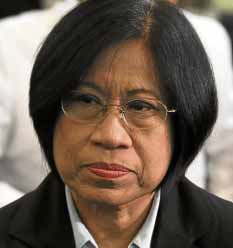SEC defends order to shut down Rappler; ready to face courts
The Securities and Exchange Commission (SEC) on Tuesday said it was ready to defend in the Court of Appeals its order revoking the registration of Rappler Inc. for its “deceptive” violation of the Constitution, which mandates Filipino control of local media.
The corporate watchdog has found legal loopholes in the structure of Philippine depositary receipts (PDRs) issued by Rappler Inc.’s controlling stockholder, Rappler Holdings Corp. (RHC), to Omidyar Network Fund LLC, an offshore fund created by eBay founder Pierre Omidyar and his wife.
In a ruling dated Jan. 11, the SEC voided the PDRs.
The SEC said Rappler may bring its case to the Court of Appeals.
Rappler argued that the SEC had approved the issuance of the PDRs in the first place and claimed that the “kill order” had the hand of Malacañang, which was allegedly upset with certain articles critical of the Duterte administration.
Article continues after this advertisement“What was approved was the issuance of PDRs as an exempt transaction, not the validity of any of its provisions,” SEC Chair Teresita Herbosa said on Tuesday.
Article continues after this advertisementExempt securities are financial instruments that do not need to be registered with the SEC, such as those sold to less than 19 investors.
Derivative instrument
PDRs refer to derivative instruments, which are based on the value of equities as underlying assets but don’t grant ownership to the holder.
These are not rare among Philippine corporate issuers. PLDT, SM Investments Corp. and even other mass media outlets like ABS-CBN and GMA 7 have issued PDRs to foreign investors.
RHC itself has issued PDRs not just to Omidyar but also to Washington-based NBM Rappler LP, a unit of North Base Media.
The SEC, however, voided only the Omidyar PDRs, which were issued in exchange for an estimated $1-million stake in Rappler.
The SEC declared the issuance of the Omidyar PDRs a “fraudulent” transaction under the Securities Regulation Code (SRC), as it violated the antidummy law.
Right to veto
Unlike the PDRs issued to North Base or even the PDRs issued by ABS-CBN and GMA 7 to foreign investors, the Omidyar PDRs carried provisions for “negative control,” or the right to veto certain corporate actions by Rappler.
The SEC said the foreign equity restriction on mass media prohibited anything less than 100 percent control.
The SEC defines “control” as “embracing not only stock ownership, but also other schemes that grant influence over corporate policy, actions and structure—even sometimes.”
To protect its investment, “Omidyar Network had RHC agree to secure approval for at least two-thirds of all the PDR holders before RHC takes any action that would prejudice the rights of Omidyar Network,” the SEC said.
Policy control
The SEC interpreted this as Omidyar Network wanting to have some degree of control over Rappler’s corporate policy.
Thus, Rappler was accused of colluding to “grant control, or to become a dummy, as long as Omidyar was not given equity per se.”
In 2015, RHC filed a notice of application for exempt transaction three times—the 264,601 PDRs issued on May 29 to NBM Rappler; the 11,764,117 PDRs issued on July 29 to NBM Rappler; and, the 7,217,257 PDRs issued to Omidyar Network.
Asked whether the SEC had seen the contentious provision that sought Omidyar Network approval on corporate matters before exempting the PDRs from registration requirements, Herbosa said, “Definitely, the handling lawyers or task force saw it for the first time when Rappler was asked to give a copy during the proceeding.”
On Dec. 22, 2016, the SEC received a letter from the Office of the Solicitor General requesting an investigation of Rappler and RHC “for any possible contravention of the strict requirements of the 1987 Constitution” in connection with the issuances of PDRs to NBM Rappler LP and Omidyar Network.
It was upon further investigation that the SEC uncovered the violation on the PDRs issued to Omidyar Network, citing the verified explanation dated Aug. 29, 2017, submitted by the group.
Curing period
But even assuming there was a violation, a securities law expert, who declined to be identified, said the penalty meted out by the SEC was “grossly disproportionate” to the alleged violation.
“The SEC should have given Rappler time to cure the violation,” the lawyer said, citing the case of PLDT.
PLDT issued new voting preferred shares to BTF Holdings Inc., a subsidiary of its employee beneficial trust fund, after the Supreme Court ruled that the telco had exceeded the maximum 40 percent in foreign equity as prescribed by the Constitution.
The high tribunal’s ruling stated that nonvoting shares should not be counted as equity when computing Filipino ownership in relation to the 60-40 percent constitutional requirement for key industries.
PLDT’s issuance of new voting preferred shares to BTF Holdings Inc. brought down its foreign holdings to the prescribed level.
The SEC afterward issued Memorandum Circular No. 8, series of 2013, giving companies not compliant with the nationality requirement one year to cure the violation.
Asked whether giving Rappler a curing period was an option, Herbosa said “the SRC does not provide for it in case of violation of any of its provisions.”
